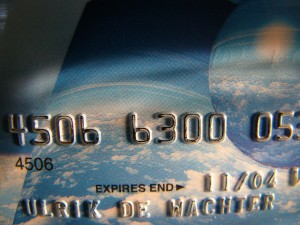Credit cards often come up in discussions about money among friends and family. Some people swear that credit cards have great financial benefits and others stay away from them at all costs. The truth is that credit cards can be part of a good financial plan if used properly, but poor use can be detrimental to your financial health.
Poor Use of Credit Cards

Credit card debt is easy to acquire and hard to pay off. Some people spend more money with credit cards, because it is so easy to swipe. The card is always there, and you don’t have to worry about having cash on hand or in your bank account. The best way to avoid this type of aggressive credit card use is with a budget. Set up a budget and always stay within your limits. Come up with a way to track your spending within your credit card to stay within your limits and avoid debt.
Cash Back and Rewards
If you use credit cards responsibly, cash back and reward points can work to your advantage. Use your card to pay for every expense you can, and earn cash back or rewards points that can be exchanged for gift cards, miles or hotels. Don’t spend more to get more cash back or points, because it will defeat the purpose. Instead, use it as a tool to save more money.
Pay Off the Card Every Month
The worst thing you can do with a credit card is carry a balance. That balance will cost you interest every month, and some cards have very high interest rates. Always pay off the balance in full every month. This way the cash back you earn will actually be money in your pocket and not spent on interest.
Maintain a Good Credit Rating
Credit cards can be an effective way to build credit if they are used correctly. Don’t carry too many credit cards at once. One good credit card, and possibly one store card for a store you go to frequently, is plenty for most consumers. More credit cards means more opportunities and temptation to overspend.
To take advantage of your credit line to improve your credit rating, never use more than half your balance. Staying under 50% will build up your credit rating and increase your score. For example, if the limit is $2,000, never let the balance on the card go over $1,000. The debt to credit ratio is used to determine a large part of your credit score. The more credit and less debt you have, the better.
Bad Habits Cost More in Late Fees
Always pay your balance in full and on time. If you pay your bill late, you will be charged late fees. On top of that, paying late by as little as a day will hurt your credit rating. Make it a habit to pay off your credit card balance in full the first day of the month. At least pay it off 5 days before the due date to make sure there are no problems. Check your account on the due date to make sure the payment went through.
Owning a credit card is a big responsibility. Your first credit card can be hard to resist and easy to rack up with debt. Resist the urge to overspend, and learn how to use the card wisely to not only avoid debt, but to save more money in the long run.
Photo credit: Ulrik De Wachter
